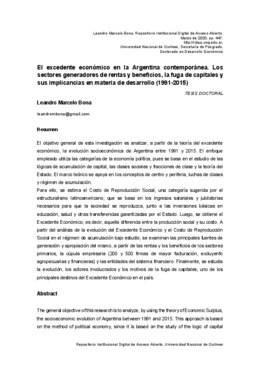El excedente económico en la Argentina contemporánea. Los sectores generadores de rentas y beneficios, la fuga de capitales y sus implicancias en materia de desarrollo (1991-2015)
Abstract
El objetivo general de esta investigación es analizar, a partir de la teoría del excedente económico, la evolución socioeconómica de Argentina entre 1991 y 2015. El enfoque empleado utiliza las categorías de la economía política, pues se basa en el estudio de las lógicas de acumulación de capital, las clases sociales y fracciones de clase y la teoría del Estado. El marco teórico se apoya en los conceptos de centro y periferia, luchas de clases y régimen de acumulación.
Para ello, se estima el Costo de Reproducción Social, una categoría sugerida por el estructuralismo latinoamericano, que se basa en los ingresos salariales y jubilatorias necesarios para que la sociedad se reproduzca, junto a las inversiones básicas en educación, salud y otras transferencias garantizadas por el Estado. Luego, se obtiene el Excedente Económico, es decir, aquella diferencia entre la producción social y su costo. A partir del análisis de la evolución del Excedente Económico y el Costo de Reproducción Social en el régimen de acumulación bajo estudio, se examinan las principales fuentes de generación y apropiación del mismo, a partir de las rentas y los beneficios de los sectores primarios, la cúpula empresaria (200 y 500 firmas de mayor facturación, excluyenfo agropecuarias y financieras) y las entidades del sistema financiero. Finalmente, se estudia la evolución, los actores involucrados y los motivos de la fuga de capitales, uno de los principales destinos del Excedente Económico en el país. The general objective of this research is to analyze, by using the theory of Economic Surplus, the socioeconomic evolution of Argentina between 1991 and 2015. This approach is based on the method of political economy, since it is based on the study of the logic of capital accumulation, social classes and class fractions and state theory. The theoretical framework uses the concepts of center-periphery, class struggle and accumulation regime.
In order to achieve this goal, we estimate the Cost of Social Reproduction, a category suggested by Latin American structuralism, which is based on the salary and retirement income necessary for society to reproduce, along with basic investments in education, health and other transfers guaranteed by the state. Then Economic Surplus (the difference between social production and its cost) is calculated. By analysing the evolution of the Economic Surplus (ES) and the Cost of Social Reproduction in the accumulation regime under study, the main sources of generation and appropriation of the ES are examined, based on the rents and benefits of the primary sectors, the biggest enterprises (top 200 and 500 firms on sales, excluding agricultural and financial) and the entities of the financial system. Finally, we analyse the evolution of capital flight in order to discuss one of the main destinations of the Economic Surplus in the country.

